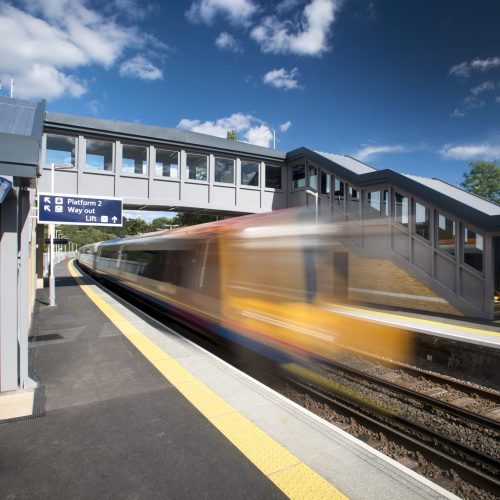The Access for All programme needs faster, cheaper delivery. Matt Smith, Managing Director, Octavius Rail, proposes ten practical steps to enhance performance.
Network Rail’s Access for All (AfA) programme is not where it should be. Although – thus far – more than 200 stations have been upgraded to offer step-free access, there are more than 2,500 railway stations in the UK. The programme’s ambitious funding has not yet translated into sufficient shovel ready projects, with nearly 20 per cent of the £350 million allocated to the AfA programme remaining unspent during Control Period (CP) 6, from 2019 to 2024.
In December 2024 Rail Minister Lord Hendy rightly challenged the industry to consider alternatives to “pairs of lifts and a bridge,” and “see where accessibility improvements could be made without massive expenditure.” And this work is taking place.
Standardising AfA solutions – pairs of lifts and a bridge – however, remains a proven way to drive cost out of AfA projects. So part of the challenge, in tandem with seeking alternatives, is understanding how delivery of a more standardised solution can be made more efficient, and thus cheaper. In addition, greater efficiencies mean faster projects, enabling limited delivery capacity to fulfil a greater volume of AfA projects.
All AfA projects are unique
Although AfA designs are moving towards greater standardisation, all AfA projects remain unique. The real challenge is in remodelling the design to meet site-specific circumstances; and tailoring project delivery to accommodate local ground conditions, site constraints, existing structures and existing infrastructure – as well as navigating how each site’s individual ecosystem of land use, space and stakeholders influence logistics.
Indeed this is something Lord Hendy has touched on, “As a real example, you can have an average cost of lifts and bridges but some of the stations in that list of 50 [stations] published by the last government would take up significant amounts of budget just because of the configuration of station.”
So, for CP 7 – the route to speeding-up and cutting the cost of AfA delivery becomes, in part, identifying the challenges common to the majority of AfA projects, and developing a set of measures, applicable to most schemes, that will help surmount them. Octavius has been delivering AfA projects since the programme’s launch in 2006. To date we have completed more than 30 projects and have a significant tranche of schemes currently in delivery; making Octavius, probably, one of the UK’s most experienced AfA delivery partner.
Our ten lessons learnt
We have undertaken an extensive lessons learnt exercise across Octavius’ nationwide AfA portfolio – through workshops with site delivery teams, supply chain partners, designers, operator/maintainers and Network Rail. The output is a report covering the top ten lessons learnt, focusing on the key risks that can significantly impact a project’s schedule or capital cost expenditure. We are sharing these lessons learnt within Octavius but also externally, with the rail industry, so collectively we can improve performance of AfA schemes in CP7 and beyond.
Our findings cover the entire project lifecycle and include, for instance:
- The need – early in the project – to precisely define requirements and the single preferred option, both from a multi-disciplinary engineering and full project lifecycle cost stance
- Greater standardisation, industry wide, of fire and security requirements was seen to have both schedule and cost benefits
- A greater understanding and accommodation of operational constraints, from the outset, will reduce cost and time delays engendered through re-design and changes in construction methodologies
- Incorporating a clear Entry into Service strategy into the design and full lifecycle programme will both cut cost and free-up resources for new AfA projects.
Complete the sign-up form below to access our Ten steps to more efficient AfA delivery – plus additional AfA resources.
You can contact our team of AfA experts at AfA@octavius.co.uk.
Access Our Growing Resource Centre
Stay informed with regularly updated resources and insights designed for professionals driving accessible rail projects. Access key reports and practical guidance to support your AfA projects. With insights into proven practices, compliance requirements and in depth summaries from InnovateUK and the House of Commons, the AfA resource centre is your starting point for delivering inclusive rail infrastructure.
Our collection is continuously growing—sign up now to stay informed as new resources are added.

